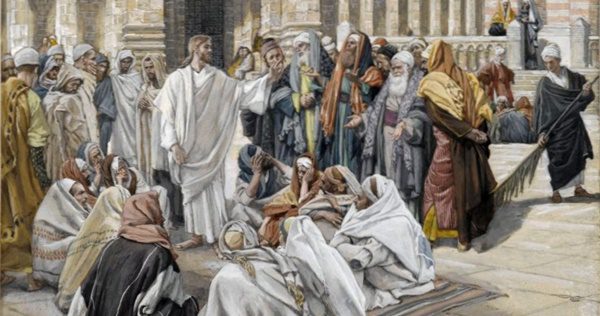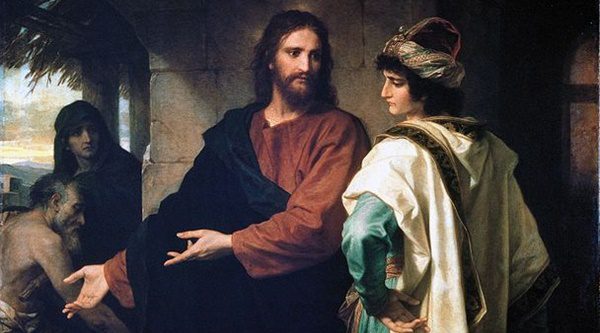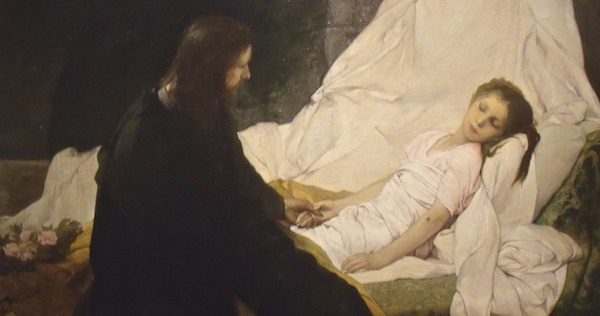He didn’t want to win. He wanted to expose the conflict between them that grew out of their rivalry with each other and their commitment to being on top at any cost.
-Rev. Tom Truby
Pastors have a frequent question when they begin to discover mimetic theory. “That’s great. But how does it preach?”
Reverend Tom Truby shows that mimetic theory is a powerful tool that enables pastors to preach the Gospel in a way that is meaningful and refreshing to the modern world. Each week, Teaching Nonviolent Atonement will highlight his sermons as examples of preaching the Gospel through mimetic theory.
In this sermon, Tom explores an episode where the Pharisees try to trap Jesus with a question. Jesus responds by flipping the question around, refusing to fall into rivalry, and revealing the Kingdom of Heaven.
Year A, Proper 21
October 1, 2017
Matthew 21:23-32
The More I See, the More I Believe
Do you have the right to teach here? What are your credentials and who authorized you?
Who gets to ask questions like that; only people coming from a place of authority. And so Jesus responds with his own question and in so doing refuses to rank himself below them.
“Did the baptism of John come from heaven, or was it of human origin?” Had God authorized John the Baptist or was John coming from a need for power; a way of winning in the human rivalry game?
His question sent the authorities into an argument with each other. They try to predict Jesus’ response and defend against it in advance. Of course they read themselves into what they think Jesus will say.
They think it’s an intellectual conflict and they fear losing because their own sense of authority is based on always winning. It’s the same logic that trapped Americans in Vietnam that said Americans are those who have never lost a war and if we lose now, how can we claim the authority to advise the world. And so the war drug on; with a double meaning to “drug”.
But that wasn’t Jesus’ motive in asking the question. He didn’t want to win. He wanted to expose the conflict between them that grew out of their rivalry with each other and their commitment to being on top at any cost. Rivalry was the sea they swam in. In exposing their rivalry he was exposing the human condition.
For them, the other side of their dilemma was the crowd—popular religion and politics. Their eye was always on the masses and governed by what the masses might do. Make the wrong move politically and you could lose your place in Jerusalem. It wasn’t about truth, what’s right, what’s real. It was about preserving their place on top of the ranks. If they had to make a decision that resulted in death for just one, or thousands, so be it. The focus wasn’t on that, it was on selling their version of reality so they wouldn’t be held responsible, at least for now. Kick the can down the road so that if anyone gets caught, it won’t be them.
Jesus’ simple question exposes all of this. The leaders can’t see any of this because they think Jesus thinks like they do. But Jesus has the capacity to know his own position, to know the source of his authority and to see where they are coming from. He sees that it’s all about rivalry; rivalry between them and ultimately rivalry with God. This is true even though the world around them sees them as the authorities, the leaders, the experts on the law.
It’s also clear that while the crowds regard John the Baptist as a prophet and thus a legitimate religious leader, the temple folk do not. Truth be known, they regard John the Baptist as a religious rival and were not unhappy when Herod had him arrested and later executed.
After much discussion they realize they can’t answer Jesus’ question without exposing themselves to either Jesus winning the debate or the crowd realizing their cynicism. They decide to take the course least damaging to themselves and answer with “We do not know”.
Somehow Jesus has out-foxed them, retained his integrity and pointed to an authority deeper than any they can claim. In the privacy of their hearts, will they begin to question themselves? Or will they fortify their position built around their privilege and commit themselves more deeply to destroying any who threaten them?
A majority will steel themselves for the kill; and continue developing rationalization and justifications for why this upstart with no pedigree or certification is an enemy of God. But a few, like maybe Nicodemus, began seeing the patterns that define reality and shift ever so slightly. A crack of light breaks in and then it’s gone. What was it they thought they saw?
In the next section we see that Jesus hasn’t left the temple. In fact, he has a second question for the chief priests and elders. His question begins with a story.
“What do you think? A man had two sons; he went to the first and said, ‘Son, go and work in the vineyard today.’ He answered, I will not; but later he changed his mind and went. The father went to the second and said the same; and he answered, ‘I go, sir’; but he did not go. Which of these two did the will of his Father? They said, ‘the first’.”
The answer seems obvious. Of course, it’s the first son. They all are quite sure they are the first son, the obedient ones, the chosen few; after all, they are the religious leaders and at the top of their culture. They are the ones with the special clothes and the highest salaries. They occupy the places of honor and everyone recognizes this. Secure in their identity, their self-esteem brimming with confidence, they look at Jesus from their perch on the catbird seat. And then the limb gets cut out from under them.
“Truly I tell you, the tax collectors and prostitutes are going into the kingdom of God ahead of you.” Do you see them falling through the air? Do you hear the air escaping their inflated self-esteem? Their pride, built on their belief they are better than almost everyone; particularly those at the bottom, has just been pricked. They will not take kindly to this. We are in Matthew twenty-one and it’s close to the end.
He has not denied them entry to the kingdom of God. They still get there but it’s the ordering that incenses them. By their own logic, if they have to get behind the tax collectors and prostitutes, it’s going to be a long wait. They had always assumed it was their job to bring those moral slackers up to speed and now Jesus tells them the slackers will get there first. The religious leader’s primary weapon in goading the slackers forward had been to threaten the last ones in the parade with exclusion. They said the gate would close and they would still be outside. Get a move on!
They thought they were essentially in already and had earned their entrance. They were smug and self-righteous and thought themselves qualified to speak for God. But now Jesus tells them the tax collectors and prostitutes were ahead of them. Jesus is attacking their ordering of the world.
Jesus now refers back to the content of his question. “Does the baptism of John come from heaven or was it of human origin?” They didn’t think John’s baptism came from God because they were in rivalry with him and didn’t like him much. He drew people away from them and debunked their authority. He was from the wilderness, the outer edge and his life style and message contradicted everything they stood for. He was the ultimate anti-establishment figure; very popular with the people and offering hope through a return to God that didn’t go through the temple. Though John the Baptist was now dead, he still remained a politically potent presence to the people.
Jesus now reveals his hand in these cultural wars when he says, “For John came to you in the way of righteousness and you did not believe him, but the tax collectors and the prostitutes believed him.” They could see that John the Baptist was from God. There was integrity to his character and he cared about them. He wanted them to live right for their sake, not because he needed to claim higher ground over them.
The tax collectors and prostitutes did need interior boundaries, rules to live by, and structures for centering their lives in God. And yes, John the Baptist was harsh and severe, and Jesus had a deeper vision, but John did care about people. He was like a parent who expresses love through insisting on ethical behavior, knowing that it makes for a better life in the long run.
The tax collectors and prostitutes, even though their lives were caught in systems of oppression, some by their own making, could see the righteousness of John and wanted to follow him. They allowed John into their lives. The religious leaders saw the same person but couldn’t see his righteousness because they were in rivalry. Believing in him would undo the foundation of their world, built as it was on thinking themselves better than others.
We come back to the question of authority. Does it come from Heaven; that place beyond human control; or is it a function of pleasing or deceiving the majority, no matter what it takes? As I watch Jesus respond to questions designed to trap him, Jesus astounds me. The more I look, the more I see, and the more I see, the more I believe. Thanks be to God.
Image: The Pharisees Question Jesus by Tissot. Wikimedia. Public Domain.
Stay in the loop! Like Teaching Nonviolent Atonement on Facebook!












